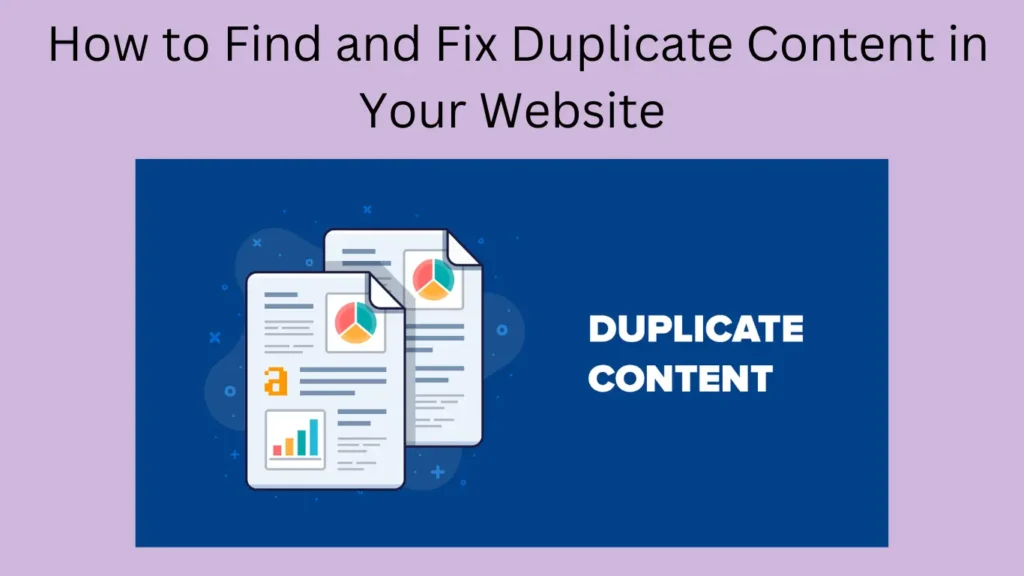Introduction
Duplicate content is a common issue that can negatively impact your website’s search engine rankings and overall user experience. Search engines strive to provide users with diverse and relevant results, and duplicate content can confuse algorithms, leading to lower rankings. In this blog post, we’ll explore the importance of addressing duplicate content and provide practical tips on how to find and fix it on your website.
Why Duplicate Content Matters
SEO Impact: Search engines penalize websites with duplicate content by potentially lowering their rankings. This is because search algorithms aim to deliver unique and valuable content to users.
User Experience: Duplicate content can confuse visitors, as they may encounter the same information in different parts of your site. This can lead to a frustrating user experience and a decrease in trust.
Crawl Budget: Search engines allocate a limited amount of time, known as crawl budget, to index your site’s pages. Duplicate content can waste this budget on redundant information, preventing search engines from indexing other valuable pages.
Finding Duplicate Content
Use Online Tools: Several online tools are available to help you identify duplicate content. Tools like Screaming Frog, Siteliner, and Copyscape can crawl your website and highlight instances of duplicate text.
Google Search Console: Google Search Console provides a Duplicate Content report, allowing you to identify pages with similar content. This tool also offers insights into which version of the content Google considers canonical.
Manual Review: Periodically reviewing your website’s content manually is crucial. Look for identical or substantially similar text across different pages and sections.
Fixing Duplicate Content
301 Redirects: If you have multiple versions of a page with similar content, use 301 redirects to consolidate them into one primary page. This signals to search engines which version is the preferred or canonical one.
Canonical Tags: Implement canonical tags on duplicate pages to specify the preferred version. This helps search engines understand which page to index and display in search results.
Rewriting Content: If you discover duplicate content within your website, consider rewriting it to make each page unique. This is a time-consuming but effective way to address the issue.
Pagination and Parameter Handling: For e-commerce websites with pagination or parameterized URLs, use rel=”next” and rel=”prev” tags to guide search engines through the series of pages and avoid duplication issues.
Conclusion
Addressing duplicate content is crucial for maintaining a healthy online presence. By regularly monitoring your website, utilizing tools, and implementing best practices, you can enhance your site’s SEO, improve user experience, and ensure that search engines prioritize your unique and valuable content. Take the time to audit your website, fix duplicate content issues, and enjoy the benefits of improved search rankings and user satisfaction.
For further Inquires Contact Us
FAQs
Q1: Why is duplicate content harmful to my website’s SEO?
Duplicate content can confuse search engines, leading to lower rankings. Search algorithms aim to provide users with unique and valuable content, and duplicates can hinder this process.
Q2: How can I find duplicate content on my website?
Use tools like Screaming Frog, Google Search Console, and manual reviews to identify duplicate text. These tools can crawl your site and highlight instances of redundancy.
Q3: What is a canonical tag, and how does it help with duplicate content?
A canonical tag is an HTML element that specifies the preferred version of a page. Implementing canonical tags on duplicate pages guides search engines to index the preferred version, preventing confusion.
Q4: Are 301 redirects effective in fixing duplicate content issues?
Yes, 301 redirects are powerful tools for consolidating multiple versions of a page into one primary page. They signal to search engines which version is the preferred or canonical one.
Q5: How often should I audit my website for duplicate content?
Regular audits are essential for maintaining a healthy online presence. Aim for periodic reviews, especially after significant content updates, to ensure that duplicate content issues are promptly addressed.
